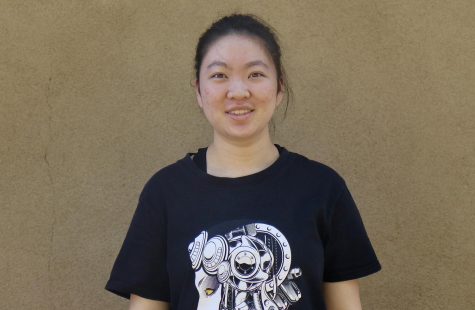Searching for lost time
Above all of these questions, a clock is ticking: as I sit here, wrestling with myself over which fruit to pick, all the fruits are rotting. I cannot stay young and unaware forever.
May 27, 2021
It is one of life’s greatest travesties that so much of our childhoods are spent dreaming and agonizing over what adulthood will be like. As an almost-high school graduate on the cusp of turning 18, about to set off into the horizon for college and careers and unfamiliar cities, I want to tell my past self to bask in the hazy time she had. I want to cloak myself in the soft memories of my youth and close my eyes. Perhaps this is what it means to finally grow up: to wish to be young again.
But I don’t want to grow up. And when I say that I wish to be younger, I don’t really mean it. In truth, the source of my nostalgia is fear — fear of the future and of my own uncertainty. Last year, when I was researching majors to prepare for college applications, that fear transformed into anger. Why was I already expected to seriously make a decision that would dictate how the rest of my life would be like, when I still felt like such a child? I was sick of hearing the same question I had been hearing all my life.
What do I want to be when I grow up? I didn’t know, and I still don’t know, and I feel like I’m running out of time.
My first memory of that question was in first grade, when we were learning the words for different kinds of jobs. I’d held a worksheet in my hand and looked at drawings of people in uniform: the policeman, with his badge and dark shirt, the fireman, with his tall ladder and wide hat, and the doctor, in her white lab coat. The question must have been posed offhandedly, something to get us engaged. In a room full of excitable 6-year-olds I can imagine there was some shouting involved. And then we moved on.
Everything sticks, though, when you are young and unaware. You can’t help it. In the same way my mind saw those pictures and latched on to the stereotypes between career and gender, the words to that question constructed an illusion so believable I fell for it for more than a decade. Growing up became a singular event, a line to be crossed, a punctuated “when,” and at some point, when I finished constructing myself an identity in the shape of a career, I would stop. We were all enveloped in our little cocoons, and once we completed our metamorphoses we would emerge fully-formed in our second skins — in our badges and dark shirts, our ladders and hats, our white lab coats.
Later on, when I became keenly aware of the permanence of this transformation and made the switch from dreaming to agonizing over adulthood, I perfected my answer to this question: a helpless shrug, a sheepish grin, “I have no idea” delivered in a self-deprecating tone, and a deflection.
But as a child, adulthood seemed eons away. So I didn’t mind it when the question was gently prodded to us from time to time. Childhood was the chance — perhaps the only chance — for this kind of boundless exploration. There were field trips to local farms and science museums, and parents would come into class and use phrases like “I work with the tooth fairy” or “my job is to make people happy.” It was a friendly thing, this question. It was dressed up in frills and pastel colors. It didn’t demand from us, so it was easy to listen to.
Coming up with answers was similarly painless. There were no expectations. I had the enviable privilege of saying absolutely whatever I wanted and not being taken seriously. For a while I was enamored with the idea of becoming a violinist, even though I never bothered to learn — I liked the way their movement, brow furrowed and arm swinging, was its own separate performance, and I also liked that string players’ faces were unobstructed by any mouthpieces or the requirement to sit and face the side of the stage. And then, like all children, there came a time, so blurry it is tempting to deny, when all I wanted to do was emulate my parents. I would observe them clicking away at the schematics of a microchip on their computers, ask them if they could explain it to me and whether I could become an “electrical engineer,” and receive the answers “no” and “absolutely not, don’t be like me.”
But I didn’t dwell on it the way I do now. These days whenever I do anything, try anything, I am wracked with anxiety, tormenting myself constantly by asking: is this the path for me? Will I be happy, in all meanings of the word, if I choose this skin to transform myself into? But back then, when I read or wrote or worked on my math homework, I wasn’t thinking about what it would be like if that action became a permanent state, a broken tape playing the same tune over and over. For the most part, in elementary school, we learned because we were supposed to, or because we found it interesting. The grander, ultimate purpose of the education system — preparing us to leave — had not been impressed on us yet. We had only just arrived.
If elementary school was idyllic, high school is a slap to the face. I know I am lucky to even be able to have so much support, to have so many possible paths to take, people I could become. But it is precisely this abundance of choices, along with the looming deadline, that paralyzes my decision-making. Should I become technology-inclined, someone my parents would prefer? Should I become a writer, or study the economy, or dedicate my time to reading through annals of history? In the face of this impasse, I opted to do what I do best: procrastinate. Throughout high school I coped by tunnel-visioning onto the next thing, and the next, and the next, squeezing my eyes shut and trying to drag my feet against the inexorable rush of time, but I can’t do that now. I’m graduating in a week. I’m off to college in three months.
What do I do? After more than a decade, I still don’t know what to be, and I’m almost — I should be — grown up. But how can I pick only one option to the exclusion of everything else? What if, down the line, I regret the hasty decision I made as a teenager, and it’s too late? Above all of these questions, a clock is ticking: as I sit here, wrestling with myself over which fruit to pick, all the fruits are rotting. I cannot stay young and unaware forever.
At least, this was how I thought about it, until I realized that my thinking was flawed.
What do you want to be when you grow up? I assumed that I would finish growing up, like crossing a line, once I finally picked a career path. I assumed that my identity, my sense of self, would be completely encompassed by that career. And I assumed that there was no going back.
None of these are true. The question lured me in and pressured me into providing an answer for all these years, when I should have been objecting to the way it was framed.
The complicated, awkward, painful process of growing up isn’t concluded by the momentous, dramatic, tangible beginning of a career. We aren’t at all like those static, inflexible moths, exiting our childhoods and staying that way until we die. We grow. We change our minds. If we dislike what we do, we switch to something else. If we hate the people we become, we quit our jobs, dye our hair, move to a different city, and so on. And neither are we solely defined by what we do — a career is only a small part of the patchwork that is our lives.
It makes me feel a little better, knowing that if I choose a path I end up disliking, I can change directions even 10 or 20 years down the road and pursue something else that will make me happy, in all meanings of the word. It makes me feel better, knowing that my choices won’t define all of who I am. It makes me feel better about how uncertain my plans are; it’s okay that I still don’t know what adulthood looks like for me.
What does it even mean to grow up? It happens without me noticing. I look in the mirror and my face seems longer, but I’ve forgotten how I used to look. I am 5 years old, struggling to reach over the bathroom counter, holding up a worksheet, marveling at the maturity of the adults around me, and all of a sudden, I am 17, and the bathroom counter comes up to my waist. I overthink the blurry memory of that worksheet and can’t understand why my past self would look up to someone like me. Sometime soon, wrinkles will start to appear at the corners of my eyes and mouth, and I’ll find gray hairs in the shower. I will grow older. I will forget the bits and pieces that make up my current self and fill the empty space with new ones. I will become someone else.
It doesn’t seem to ever stop. There is one part of me that I want to preserve, though. I remember when I was a child I used to look at the world in both fear and fascination. I wasn’t yet weighed down by the kind of wariness that appears when the novelties of living start to wear off. I would grab mindlessly at the fruit in front of me and always tasted the same cool sweetness between my teeth. No matter where I go or what I do or who I become, I want to hold onto that sense of wonder with all of my might, and if this is one way I’ll never grow up, is that such a bad thing?



































































